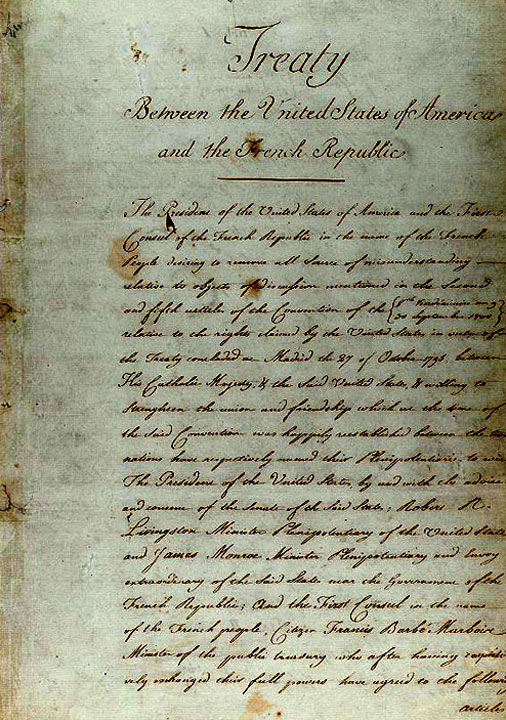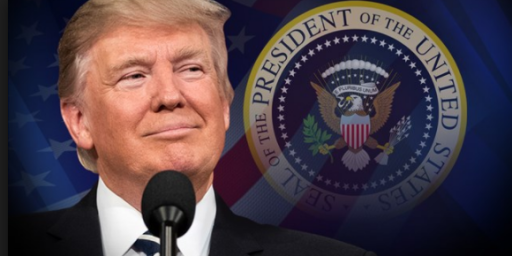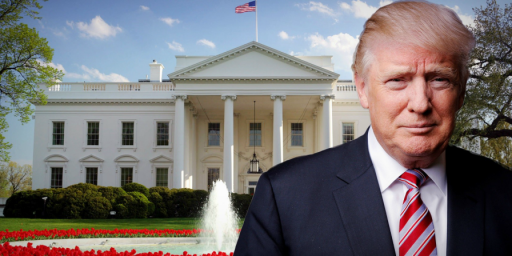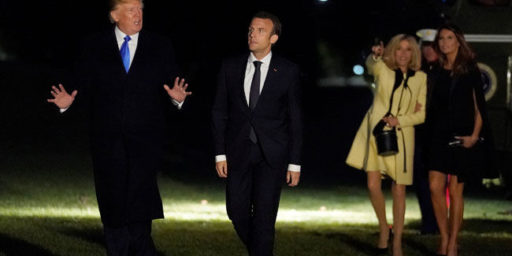Bush Tying Next President’s Hands
 The New York Times editorial board makes a rather bizarre argument:
The New York Times editorial board makes a rather bizarre argument:
President Bush is discussing a new agreement with Baghdad that would govern the deployment of American troops in Iraq. With so many Americans adamant about bringing our forces home as soon as possible, a sentiment we strongly share, Mr. Bush must not be allowed to tie the hands of his successor and ensure the country’s continued involvement in an open-ended war.
One can certainly disagree with the specifics of the agreement and argue that it is unwise public policy. Or, one can rail against the entire concept of executive agreements, citing the Constitution’s requirement that the Senate provide advise and consent on treaty obligations. But to say that a president “must not be allowed” to exercise the powers of his office because the next guy might not like what he’s doing makes no sense.
We elect presidents to fixed terms of office. Barring unforeseen circumstances, Bush is president — with all of the powers, rights, duties, and responsibilities that come with the office — until noon on 20 January 2009. He has slightly more than a quarter of his term remaining.
For the next 368 days, then, Bush and only Bush will be making executive agreements with other countries. Is he to cease doing that because his successor might wish to adopt a different policy? At what point, precisely, does the obligation not to “tie the next president’s hands” kick in? Is it a gradual thing, or does it happen all at once?
Photo credit: Nigh Invulnerable via Google.
UPDATE: When looking for a photo earlier, I stumbled on this video at Catherine Morgan‘s site of Hillary Clinton whining at the Democratic debates about this very thing:
The idea that Congress has the power to pass legislation, which Clinton is touting and Obama backed in the debate, to force a sitting president to submit his executive agreements to Congress for approval is laughable. They’re an inherent power of presidents going back quite literally to the Washington and Jefferson administrations.
Unlike treaties, which require ratifications by two-thirds vote in the Senate, no executive agreement Bush makes would literally tie the hands of the next president. Obama, Clinton, McCain, or whoever could change the policy the moment he takes office. In reality, it’s hard to do for a variety of political reasons but that’s too bad.






Really? Who’s taking over on Monday?
Heh. Fixed. I’ve got “2008” on the brain, I guess. – jhj
Yeah, every president since Washington has tied every other president’s hands. The Congress does even more so. That’s why we have a representative democracy rather than an autocracy.
It’s a strength of our system not a weakness.
The article calls for “transparency” in negotiations with Iraq, and Congressional intervention. “Must not be allowed” is a reference to the checks and balances that are supposed to protect us when a whack-job has the White House for 368 more days.
Literally, Congress does have the power that JJ says it doesn’t, via its power of the purse. “If Bush does X, we will defund all activities pertaining to X, and criminalize the use of other funds for X.”
Politically, of course, it’s a non-starter.
Right. It can try to do almost anything that way. I’m just saying that a straight bill limiting Bush’s power, as Hillary proposes, is unconstitutional. There are always extra-constitutional ways of wielding power, though.
One of the weaknesses of an executive agreement is that the next executive can agree to something else. So what is the real objection? That the next president has a fig leaf to continue in Iraq (“Well, I don’t want to, but because of the evil Bush there is this agreement and I can’t back out of it”) and that it raises the stakes in backing out (all executive agreements that the next president might want to make become less valuable if he breaks this one).
I suspect that the NYT position can be best read in light of their political position. As an example, imagine them relating stories about 121 young black men who have killed others (not giving you the facts as to how many whee DUI, manslaughter’s, first degree murder, etc) as a front page article about the dangers of young black males. Not going to happen. But they will gladly do such a piece on Iraq veterans. In short, they are part of why less than 20% of the country believes most or all of what they hear in the MSM.
In addition to Hillary making this point, The Politico reported that this is the new theme of the anti-war left, having failed to cut funding for the war:
In recognition of hard political reality, the groups instead will lower their sights and push for legislation to prevent President Bush from entering into a long-term agreement with the Iraqi government that could keep significant numbers of troops in Iraq for years to come.
The groups believe this switch in strategy can draw contrasts with Republicans that will help Democrats gain ground in November and bring the votes to pass more dramatic measures.
It was a story at The Politico; at the Times it became their lead editorial.
It seems to me that an agreement between the US and Iraq on troop deployments in Iraq, would have to go to Bush making and ratifying a treaty with a foreign government that congress would need advise and consent. Given Bush’s self declared omnipotent unitary executive power in wartime, I wonder if he realizes his “executive orders” are not set in stone for the next prez.
Great point, yetanotherjohn!
Liberals all rail rhetoric against the war, but they won’t do anything to stop it. What a bunch of wimps they are! Even the muslim B. Hussain Obama, who had kept up his stance against the war, voted to continue funding it! Hypocrites all.
Please please please liberals! Tell me which of your candidates for prez actually have the courage to lead this great country? I cannot think of a one.
Christopher = Liar!
lol! How am I a liar? The guy has a muslim name! Would you vote for a muslim for prez?
Oh that’s right! He does belong to a racist church. Would you vote for a racist?